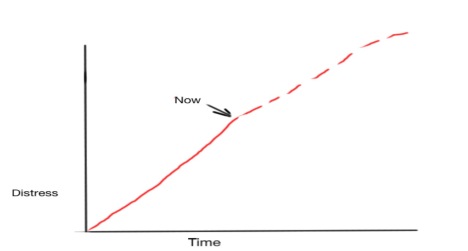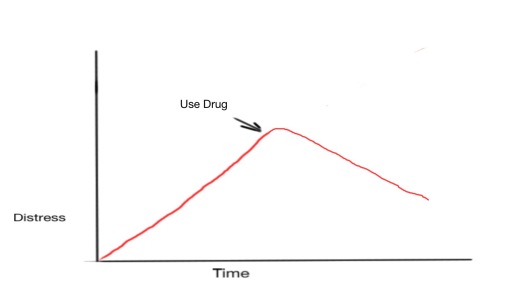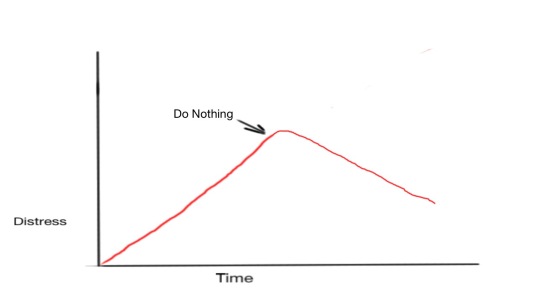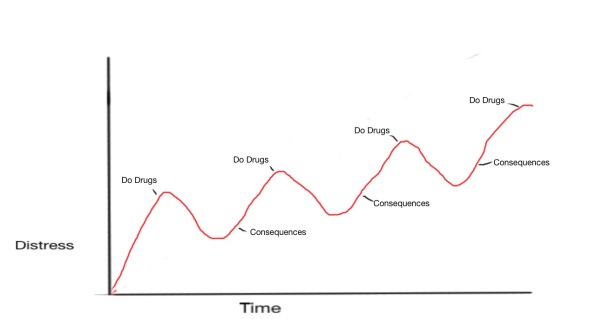So, you’ve stopped drinking or drugging. The addiction seems to have gone away.
Has it, really?
Addiction takes cover sometimes when it feels threatened. It’ll hide in the bushes and come roaring out when you least suspect it. Make no mistake, addiction is cunning, baffling, and very, very patient. While you’ve been collecting key rings at your NA meeting, the addiction has been doing pushups in the dark.
Addiction prefers the dark. It likes to perform its dirty deeds in secret. The night belongs to Michelob. However, addiction is rarely ever a real secret. It’s kidding you when you believe it leaves no trace. You can tell when addiction is still afoot if you are willing to read the signs.
These are the signs:
You haven’t done the things promised for your recovery
If the problem behavior is gone, but you still haven’t been to see a therapist, attended meetings, written that letter of apology, changed associates, or done any of the things you promised, then the addiction is just hoping you won’t notice.
The behavioral changes have been minor
The more serious the addiction has been, the more excited you’ll be when there’s been a slight improvement.
You were drinking every day, now you’re thrilled that you cut down to once a week. You used to put your whole your paycheck into your arm, now you’re just chipping a little. The underlying attitudes towards drinking and drugging have not changed; the only thing changed is the frequency and severity.
When gardeners trim bushes back a little, they call it pruning; it doesn’t destroy the bush, it makes it grow more. The same thing happens when only minor changes are accomplished. You wouldn’t be satisfied with your surgeon if you had a mastectomy and he left some cancer behind, so don’t fool yourself by minor behavioral changes.
Other problems have arisen
Sometimes addiction plays whack-a-mole by extinguishing one problem behavior, only to transfer it to another. We see this frequently with addicts who will use one drug until the heat is on, and then switch to a different drug. Instead of scoring heroin on the street and using dirty needles, they get their narcotics from a doctor. You’ll think that’s an improvement, until you start to abuse those pills, too. The underlying issue remains.
Your thinking has not changed
If the rationalizations that have justified the addiction are still in evidence, then nothing has not gone away. You used to say you needed to drink, so you drank. Now, you don’t drink, but you still say you need to. Guess what? You’ll drink again. If the madness was truly gone, you’d no longer believe you needed it.
No fence has been built
It is not enough just to change the problem behavior to recover from addiction. You also have to know the route that it takes before it arrives. You need to put up a gate and shut out behavior that, in itself, is not problematic, but leads up to the problem.
Relapse comes masquerading as something harmless so that you will not see it coming. There’s nothing wrong with having a glass of wine at dinner or a pain medication that was prescribed by your doctor, right? No, not at all, except for where that leads, for you.
Authentic recovery means that you see through all the disguises.
You minimize your history
If the story you tell about your addiction differs significantly from your partner’s, then it’s still lurking about. If you talk about it only in terms of your suffering and leave out how it affected others, then you’ve not incorporated other points of view into your own. Your limited perspective is still all you have. You have an incomplete appreciation of the costs of your choices. You should be able to tell your partner’s side of the story as well as your own.
You’re withdrawn
If your partner complains that you’re virtually unreachable, emotionally inaccessible, or sexually uninterested, then relapse is waiting for its chance to strike. It doesn’t want people to ask too many questions, know too much, or get too close.
You’re always angry
You may be blaming other people for calling out your addiction and challenging it. you may be using anger as a way to keep others away, off balance, and uninformed. You may still be taking sides with it, against anyone who cares.
Your partner is working harder at recovery than you are
Your partner has been on you like white on rice. Ever since you had that relapse, she’s been monitoring your phone for drug dealers, checking your whereabouts, scanning your emails, opening your letters. She doesn’t let you go anywhere without her. She scrutinizes your eyes whenever you come home at night. She’s gone to more Al-Anon meetings than you’ve attended AA. She found a therapist for you, set up the appointment, went to every session, paid, and did the homework assignments. Your partner is working harder than you are.
If you have not taken responsibility for change, then you will not make the right choices the moment your partner’s back is turned.
You say everything is changed
You’re not the one to judge whether anything has changed. When your addiction fools people, it fools you first.
You want to move on and not get stuck in the past
That’s the addiction talking, trying to convince you to not learn from the past. Truly recovering people remind themselves of the past regularly, so that they’ll not repeat it.
You want credit for improvements
An adult straightens the house every day. He scrubs the toilets when they need it and mops the floor when it’s dirty. He doesn’t expect a medal for it. He just does it because it needs doing.
A toddler tickles the furniture with a feather duster once in a while and everyone will fall all over him, saying he was very helpful. That’s what they do for a child. Are you a child?
When madness takes over: the less you do, the more credit you think you deserve.
In a healthy world: you don’t earn special points for doing what you should have been doing all along.
It’s still all about you
Not only have you stopped the problematic behavior, but you’ve been going to therapy, attending AA, writing in your journal, and getting in touch with your feelings. These are all good things, but you’re still as self-involved as ever.
Real change means taking action towards becoming more loving, generous, caring, and empathetic towards others.
You looked over this list and you did not find a single thing that indicates relapse may be lurking. There seem to be no signs. Well, that’s your sign. If you aren’t seeing signs, then you’re fooling yourself. There are always signs.
The road to recovery is the same road as the road to ruin; you’re just traveling in a different direction. You pass by the same markers as when you were heading to ruin. You should be seeing them now and recognizing them for what they are. You should also be seeing some signs that indicate you are heading in the right direction. You should be seeing meaningful change.






